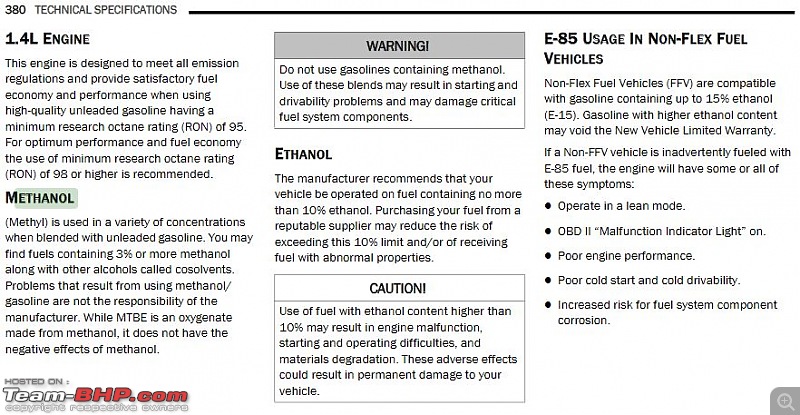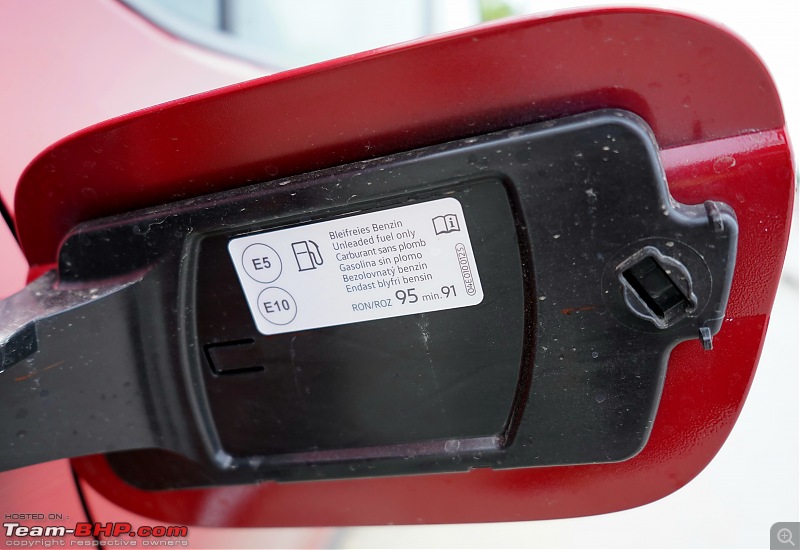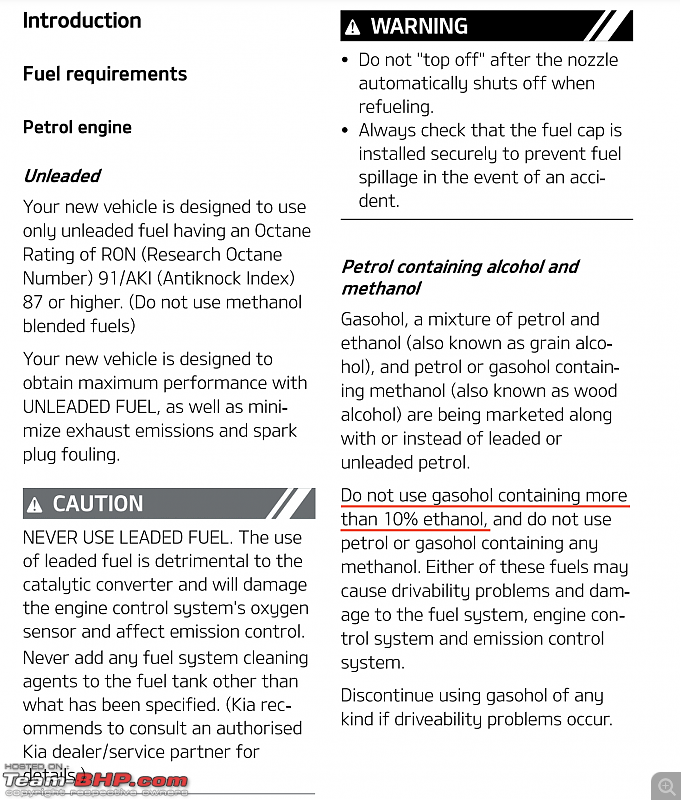Team-BHP
(
https://www.team-bhp.com/forum/)
Gentlemen, I've been sitting on the fence a long time on the Jeep Compass. The economics (in my situation) favour the Petrol, but I found the Diesel to be the better of the two.
Having said that, budget was (and is) still a constraint, and given that I can see myself using the 4x4 only in specific conditions, it annoyed me no end that Jeep didn't offer the diesel in a 4x2 trim. Plus the current markups between versions are simply astronomical and Jeep should by now know very well there is a case for a 4x2 to bridge the gaps in trims for those who don't need the 4x4 but can still enjoy that diesel motor.
So while I was researching in detail on both - I came across a somewhat worrying detail mentioned in the Jeep's owners manual, and that's to do with the fuel specifications, in particular - the petrol and the maximum blend of Ethanol that can be used. Guess what? The max that's recommended is a 10% ethanol blend.
Given that the government in it's infinite wisdom has been pushing for greater concentrations of ethanol blends in petrol going forward, even advancing the target to 2025, I wonder if this has been factored by owners who either purchased the vehicle already or intend to buy the petrol version.
I dare say I wouldn't be out of place to think if the higher blends of ethanol were to wreck havoc with the functioning of the engine, Jeep would not be wrong to deny warranty claims or support on it?
Here's the extract from the owners manual taken off Jeep's site.

What do you fellow bhp folks have to say on this? Frankly, I think this has now become a pertinent question for all buyers of new petrol fueled vehicles. Come 20% ethanol - are current vehicles good to support it? If not - why are they being allowed to be sold? And, if they are being allowed to be sold - what does one do when the fuel blend is 20% (force majeure) and something goes wrong with the engines performance - how are the buyers going to be safeguarded? Let's face it - 2025 is just 3.4 years away! Well within the realistic ownership period targets of most buyers me thinks?
@Vandit I never saw this ethanol blend limit of 10% mentioned for other cars. Anyone has any more points for this?
Quote:
Originally Posted by dsr001
(Post 5125424)
@Vandit I never saw this ethanol blend limit of 10% mentioned for other cars.
|
Should be mentioned in the owner's manual for most cars, at least the international ones. For example - here is a pic of the Volkswagen Taigun that we drove recently which mentions E5 or E10 grades only.

Quote:
Originally Posted by dsr001
(Post 5125424)
@Vandit I never saw this ethanol blend limit of 10% mentioned for other cars. Anyone has any more points for this?
|
I haven't really checked specifically for other cars since I was looking to understand the pros and cons of buying the Jeep. That's when I came across this. I enjoy some time looking at the owners manuals of the same vehicle in different markets to get an idea of what features have been deleted and what possibilities exist for later mods on the same platform. For example, the compass is exported to other RHD markets right from the Pune factory, yet Jeep has deleted quite a few features, some that make little sense like remote engine start from the key, cruise control in the manual trim (even cars in the 10L range offer this!!)
Although I didn't specifically set out to look for this detail, I coincidentally came across an article that said manufacturers were not keen on the government rushing the higher ethanol blends because the current vehicles were not designed to run on such a high ethanol value and it could cause several issues with the functioning of the engine and hardening of pipes and other components etc. I'm not an expert in powerplant mechanics but I can expect that having a different proportion of two dissimilar combusting fuels in an engine not designed to support it is going to have issues of some sort.
This is one of the reasons why I've reconsidered going for a petrol vehicle altogether irrespective of the manufacturer! Unless specifically guaranteed or stated by a car maker. It's actually a catch 22 situation right now. Diesel will likely attract heavier taxation and premium in the coming years as the shift towards cleaner fuels and electric vehicles takes greater hold which means possible exposure to higher running expenses for Diesel owners. On the other hand, nobody's addressing the issue of forward compatibility and buyer safeguards for models currently on sale with respect to higher concentration of ethanol in petrol fuelled vehicles!
Quote:
Originally Posted by Vandit
(Post 5125065)
Gentlemen, I've been sitting on the fence a long time on the Jeep Compass. The economics (in my situation) favour the Petrol, but I found the Diesel to be the better of the two.
Having said that, budget was (and is) still a constraint, and given that I can see myself using the 4x4 only in specific conditions, it annoyed me no end that Jeep didn't offer the diesel in a 4x2 trim. Plus the current markups between versions are simply astronomical and Jeep should by now know very well there is a case for a 4x2 to bridge the gaps in trims for those who don't need the 4x4 but can still enjoy that diesel motor.
What do you fellow bhp folks have to say on this? Frankly, I think this has now become a pertinent question for all buyers of new petrol fueled vehicles. Come 20% ethanol - are current vehicles good to support it? If not - why are they being allowed to be sold? And, if they are being allowed to be sold - what does one do when the fuel blend is 20% (force majeure) and something goes wrong with the engines performance - how are the buyers going to be safeguarded? Let's face it - 2025 is just 3.4 years away! Well within the realistic ownership period targets of most buyers me thinks?
|
Government initiative is good considering the fuel price and climate.
While E20 fuel will start, the current E10 fuel will continue in parallel. 2025 will not be a hard deadline and it cannot be as the E20 fuel will have detrimental effect on engine. Also due to the lower energy density of the fuel, will have adverse impact on over all power of the engine.
The car manufacturers need to do a lot of changes to adapt the E20 fuel.
Brazil do have E100 fuel, so it is very much achievable.
However the E15 fuel did had adverse effect soon engine when tested on Nissan with E10 engine.
So the fuel and engine will see very dynamic changes in next couple of years.
With IPCC papers and all government taking up climate change very seriously, EV engines will be the future until there is another break through in transportation.
MOD Note : Please quote ONLY the relevant bits of a post. Quoting a full, long post inconveniences our mobile readers.
Thanks!
Quote:
Originally Posted by Vandit
(Post 5125065)
What do you fellow bhp folks have to say on this? Frankly, I think this has now become a pertinent question for all buyers of new petrol fueled vehicles. Come 20% ethanol - are current vehicles good to support it? If not - why are they being allowed to be sold? And, if they are being allowed to be sold - what does one do when the fuel blend is 20% (force majeure) and something goes wrong with the engines performance - how are the buyers going to be safeguarded? Let's face it - 2025 is just 3.4 years away! Well within the realistic ownership period targets of most buyers me thinks?
|
Now this is surprising because my Ecosport Ecoboost of 2017 and all the Ecosport petrols thereafter are specified to run on upto E20 petrol blend.
Are you sure this is the latest manual?
Thanks for sharing, Vandit! Moving your post out to a new thread as the topic deserves a dedicated discussion.
@ BHPians, if you should spot any good post in an existing thread that deserves its own new thread, please report the post and we'll move it out for greater visibility.
Thank you!
This is truly an eye opener. Thanks for sharing this information.
And the problem is the way our government typically goes about policy changes with relatively short notice, I would feel a bit conflicted if I was in the market for a petrol vehicle anytime very soon till the fuel is actually launched. Ideally they should be giving a really long lead time for any such move and ensure that car makers are required to bring compliant vehicles at least 3 - 5 years before the transition. And have a further 3 - 4 year period when both fuel are sold in parallel. So people don’t need to dispose cars prematurely or stand the risk of damage just because of fuel parameter changes halfway into their ownership cycle.
Quote:
Originally Posted by Axe77
(Post 5126196)
And the problem is the way our government typically goes about policy changes with relatively short notice
|
Short notice indeed.
The E-20 roadmap was proposed on the occasion of World Environment Day, 5 June 2021 and consists of the below target milestones:
- Raise pan-India ethanol production capacity from the current 700 to 1500 crore litres
- Phased rollout of E10 fuel by April 2022
- Phased rollout of E20 from April 2023, its availability by April 2025
- Rollout of E20 material-compliant and E10 engine-tuned vehicles from April 2023
- Production of E20-tuned engine vehicles from April 2025
https://www.niti.gov.in/expert-commi...ing-india-2025 Quote:
Originally Posted by Axe77
(Post 5126196)
I would feel a bit conflicted if I was in the market for a petrol vehicle anytime very soon till the fuel is actually launched.
|
Diesel has it's own headaches too!
Frankly this E20 rollout is stupidity of the highest order. Encourages more sugar cane production - when we should be discouraging the production of such a wasteful water inefficient crop, messes up engines and supply chains and reduces driving pleasure. Unfortunately, politicians from every party are involved in the sugar mafias - and will roll these out.
I do hope they maintain the parallel supply of genuine petrol so that customers can retain an option, even if at a higher cost.
I was expecting Ethanol to be dirt cheap.
However, it is not.
The prices of Ethanol ranges between Rs 45 to 60 per liter (Depending on the source from which the Ethanol was extracted).
Compare this to the pre-tax price of petrol, i.e. Rs40 per liter.
How is this going to benefit the End Customer?
Quote:
Originally Posted by Vandit
(Post 5125065)
What do you fellow bhp folks have to say on this? Frankly, I think this has now become a pertinent question for all buyers of new petrol fueled vehicles.
|
Thanks for discussing this, I'm worried too.
Quote:
Originally Posted by dsr001
(Post 5125424)
@Vandit I never saw this ethanol blend limit of 10% mentioned for other cars. Anyone has any more points for this?
|
It's mentioned in Kia Sonet's user manual as well (attaching the relevant page).

Woah. Thanks @GTO although I didn't expect this would be a thread on it's own.
Essentially while I do understand the Government's motive behind the E20 spec, and it is possible they could continue having both fuels being sold alongside while it's a phased push to the E20 spec, there were a few points I thought of when I saw the note in the Jeep's manual.
1. The possibility of a mistake when re-fueling is quite real and if that results in an E20 spec being put in on an E10 only car, what then?
2. The govt pushing E20 for mass market adoption would eventually mean they need people to move towards using that fuel spec if that's the case, it would make little sense in permitting the E10 for continued circulation for much longer once E20 comes online. Since there will continue to be all these relatively new (as well as older gen) vehicles still on the road that require to run on E10 - how then would they manage the push to E20?
3. Also from a refiners point of view - having to produce both E10 and E20 spec would add to their manufacturing and logistical tasks and processes too instead of having just focus on 1 main spec?
To my mind I also feel that brands should do their part in ensuring buyers make an informed decision or atleast make them aware of the need to be careful in using the correct fuel spec at all times.
Quote:
Originally Posted by robincsamuel
(Post 5126349)
It's mentioned in Kia Sonet's user manual as well (attaching the relevant page).
|
Shouldn't the BS6 compliant engines be complaint to the E10 presently and going forward E20 mixed fuel. Isnt this what the govt wanted when they phased out the BS4 engines and the car manufacturers complied?
This seems like another ill thought spur of the moment announcement without a long term vision. Is there solid data comparing ethanol and regular fuel? Is one significantly better than the other?
And why this despite an electric push?
I believe this means the regular fuel will be sitting at the 100 Rs mark for the distant future.
Quote:
Originally Posted by abhishek46
(Post 5126308)
How is this going to benefit the End Customer?
|
Who said it was about benefitting the end customer? lol:
More like - not so befitting end to the customer!
| All times are GMT +5.5. The time now is 06:57. | |




